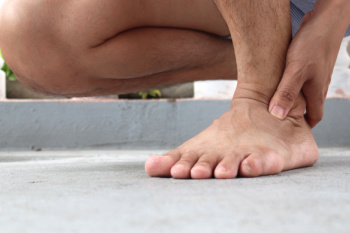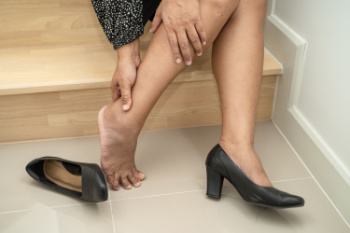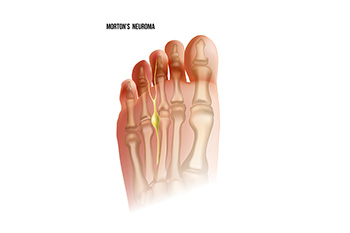
Blog (800)
Why Live with Pain and Numbness in Your Feet?
Complications of Foot Neuropathy

Peripheral neuropathy can lead to significant medical complications, particularly affecting the feet, heart, and circulation. Diabetic polyneuropathy, a common variant, often results in diabetic foot ulcers, slow-healing skin wounds or sores, primarily due to reduced foot sensation, making injuries more likely. Elevated blood sugar levels can damage blood vessels, impairing foot blood supply and healing, sometimes progressing to gangrene. When infections in neuropathic feet worsen, they may require surgery to remove damaged tissue and antibiotic treatment. If you have peripheral neuropathy, and especially if you also have diabetes, it is strongly suggested that you schedule regular appointments with a podiatrist for ongoing treatment. Diagnosing problems as early as possible may help to prevent serious complications of peripheral neuropathy.
Neuropathy
Neuropathy can be a potentially serious condition, especially if it is left undiagnosed. If you have any concerns that you may be experiencing nerve loss in your feet, consult with one of our podiatrists from Westland Foot & Ankle Specialists, P.C.. Our doctors will assess your condition and provide you with quality foot and ankle treatment for neuropathy.
What Is Neuropathy?
Neuropathy is a condition that leads to damage to the nerves in the body. Peripheral neuropathy, or neuropathy that affects your peripheral nervous system, usually occurs in the feet. Neuropathy can be triggered by a number of different causes. Such causes include diabetes, infections, cancers, disorders, and toxic substances.
Symptoms of Neuropathy Include:
- Numbness
- Sensation loss
- Prickling and tingling sensations
- Throbbing, freezing, burning pains
- Muscle weakness
Those with diabetes are at serious risk due to being unable to feel an ulcer on their feet. Diabetics usually also suffer from poor blood circulation. This can lead to the wound not healing, infections occurring, and the limb may have to be amputated.
Treatment
To treat neuropathy in the foot, podiatrists will first diagnose the cause of the neuropathy. Figuring out the underlying cause of the neuropathy will allow the podiatrist to prescribe the best treatment, whether it be caused by diabetes, toxic substance exposure, infection, etc. If the nerve has not died, then it’s possible that sensation may be able to return to the foot.
Pain medication may be issued for pain. Electrical nerve stimulation can be used to stimulate nerves. If the neuropathy is caused from pressure on the nerves, then surgery may be necessary.
If you have any questions, please feel free to contact our office located in Westland, MI. . We offer the newest diagnostic and treatment technologies for all your foot care needs.
Foot Pain Management

Managing foot pain involves a comprehensive approach aimed at ensuring effective relief and long-term foot health. Initially, a precise diagnosis from a podiatrist is essential, which is achieved through a combination of medical history assessment, physical examination, and diagnostic tests such as X-rays or MRI scans. Once the underlying cause is identified, various forms of treatment can be considered. Custom-made orthotic inserts tailored to provide personalized support, correct gait abnormalities, and alleviate pressure on problem areas of the feet can be prescribed. Suggestions for appropriate shoes for needed arch support, cushioning, and fit might be given. Foot splints or braces can be beneficial for specific conditions, and surgical procedures are considered when conservative measures fail to address structural issues or severe pain. Lifestyle modifications, including weight management and activity adjustments, are emphasized to reduce stress on the feet. If you are suffering from foot pain, it is suggested that you schedule an appointment with a podiatrist to manage the pain, improve mobility, and enhance overall quality of life.
Foot Pain
Foot pain can be extremely painful and debilitating. If you have a foot pain, consult with one of our podiatrists from Westland Foot & Ankle Specialists, P.C.. Our doctors will assess your condition and provide you with quality foot and ankle treatment.
Causes
Foot pain is a very broad condition that could be caused by one or more ailments. The most common include:
- Bunions
- Hammertoes
- Plantar Fasciitis
- Bone Spurs
- Corns
- Tarsal Tunnel Syndrome
- Ingrown Toenails
- Arthritis (such as Gout, Rheumatoid, and Osteoarthritis)
- Flat Feet
- Injury (from stress fractures, broken toe, foot, ankle, Achilles tendon ruptures, and sprains)
- And more
Diagnosis
To figure out the cause of foot pain, podiatrists utilize several different methods. This can range from simple visual inspections and sensation tests to X-rays and MRI scans. Prior medical history, family medical history, and any recent physical traumatic events will all be taken into consideration for a proper diagnosis.
Treatment
Treatment depends upon the cause of the foot pain. Whether it is resting, staying off the foot, or having surgery; podiatrists have a number of treatment options available for foot pain.
If you have any questions, please feel free to contact our office located in Westland, MI. . We offer the newest diagnostic and treatment technologies for all your foot care needs.
Tips to Prevent Running Injuries

Preventing running injuries involves improving your form through targeted exercises. Incorporate core workouts such as glute bridges and side planks to bolster strength, balance, and stability, reducing the risk of overuse injuries. Maintain an erect spine, lengthen through the crown of your head, and perform head and neck exercises to build the strength necessary for good posture and a forward gaze. Pay attention to arm movement, keeping elbows bent at a 90 degree angle, and swing your arms forward and backward while avoiding crossing or twisting. In addition to these form improving practices, focus on improving hip and ankle mobility to reduce low back and knee injuries, and increase your steps per minute to minimize stress on your body. Gradually increase the duration, intensity, and frequency of your runs, and take breaks for muscle pain or injuries. Additionally, wear appropriate running shoes, avoiding overly cushioned options, and replace them regularly to ensure optimal support. If you are experiencing foot, toe, or ankle pain from running, it is suggested that you schedule an appointment with a podiatrist for an exam and suggested treatment options.
All runners should take extra precaution when trying to avoid injury. If you have any concerns about your feet, contact one of our podiatrists of Westland Foot & Ankle Specialists, P.C.. Our doctors will treat your foot and ankle needs.
How to Prevent Running Injuries
There are a lot of mistakes a runner can make prior to a workout that can induce injury. A lot of athletes tend to overstretch before running, instead of saving those workouts for a post-run routine. Deep lunges and hand-to-toe hamstring pulls should be performed after a workout instead of during a warmup. Another common mistake is jumping into an intense routine before your body is physically prepared for it. You should try to ease your way into long-distance running instead of forcing yourself to rush into it.
More Tips for Preventing Injury
- Incorporate Strength Training into Workouts - This will help improve the body’s overall athleticism
- Improve and Maintain Your Flexibility – Stretching everyday will help improve overall performance
- “Warm Up” Before Running and “Cool Down” Afterward – A warm up of 5-10 minutes helps get rid of lactic acid in the muscles and prevents delayed muscle soreness
- Cross-Training is Crucial
- Wear Proper Running Shoes
- Have a Formal Gait Analysis – Poor biomechanics can easily cause injury
If you have any questions, please feel free to contact our office located in Westland, MI. . We offer the newest diagnostic and treatment technologies for all your foot care needs.
Plantar Warts Can Be Treated!
Podiatrists Are Foot Care Experts

Podiatrists are specialized healthcare professionals who focus on the diagnosis, treatment, and prevention of disorders related to the feet and lower extremities. Podiatrists undergo extensive education and training, equipping them with the knowledge to address a spectrum of foot conditions, from common ailments to complex issues. Their responsibilities encompass conducting thorough examinations, utilizing diagnostic tools, and devising personalized treatment plans. Podiatrists commonly treat conditions such as bunions, heel pain, and toenail disorders. They may also provide guidance on proper foot care, footwear selection, and preventive measures. These professionals operate in diverse settings, including private practices, hospitals, and outpatient clinics. Some podiatrists specialize further in areas, such as sports medicine or surgery, offering comprehensive care for individuals of all ages. If you have foot or ankle problems, it is suggested that you make an appointment with a podiatrist.
If you are dealing with pain in your feet and ankles, you may want to seek help from a podiatrist. Feel free to contact one of our podiatrists from Westland Foot & Ankle Specialists, P.C.. Our doctors can provide the care you need to keep you pain-free and on your feet.
What Is a Podiatrist?
A podiatrist is a doctor of podiatric medicine who diagnoses and treats conditions of the foot, ankle, and related structures of the leg. Your podiatrist may specialize in a certain field such as sports medicine, wound care, pediatrics, and diabetic care. Podiatrists have the ability to become board certified through training, clinical experience, and then taking an exam.
What Do Podiatrists Do?
On a daily basis, a podiatrist may perform the following activities:
- Diagnose foot ailments such as ulcers, tumors, fractures, etc.
- Use innovative methods to treat conditions
- Use corrective orthotics, casts, and strappings to correct deformities
- Correct walking patterns and balance
- Provide individual consultations to patients
It is very important that you take care of your feet. It’s easy to take having healthy feet for granted, however foot problems tend to be among the most common health conditions. Podiatrists can help diagnose and treat a variety of feet related conditions, so it is crucial that you visit one if you need assistance.
If you have any questions please feel free to contact our office located in Westland, MI. . We offer the newest diagnostic and treatment technologies for all your foot and ankle needs.
Podiatric Care For Morton’s Neuroma

Morton's neuroma is a condition that affects the forefoot. Despite its name, it is not a true neuroma but rather a result of nerve fibrosis. This fibrosis occurs due to pressure or repetitive irritation, resulting in the thickening of the digital nerve, typically found in the third or second intermetatarsal space. Managing Morton's neuroma involves various treatment options. Orthotics, which are custom-made shoe inserts, can provide relief by altering foot mechanics and reducing pressure on the affected nerve. Steroid injections can also be administered to alleviate inflammation and pain. In more severe cases, surgical excision may be necessary, typically performed through a dorsal approach. Successful management of Morton's neuroma relies on several critical factors. If you feel you have Morton’s neuroma, it is suggested that you schedule an appointment with a podiatrist. A thorough examination is essential to accurately diagnose and treat this condition.
Morton’s neuroma is a very uncomfortable condition to live with. If you think you have Morton’s neuroma, contact one of our podiatrists of Westland Foot & Ankle Specialists, P.C.. Our doctors will attend to all of your foot care needs and answer any of your related questions.
Morton’s Neuroma
Morton's neuroma is a painful foot condition that commonly affects the areas between the second and third or third and fourth toe, although other areas of the foot are also susceptible. Morton’s neuroma is caused by an inflamed nerve in the foot that is being squeezed and aggravated by surrounding bones.
What Increases the Chances of Having Morton’s Neuroma?
- Ill-fitting high heels or shoes that add pressure to the toe or foot
- Jogging, running or any sport that involves constant impact to the foot
- Flat feet, bunions, and any other foot deformities
Morton’s neuroma is a very treatable condition. Orthotics and shoe inserts can often be used to alleviate the pain on the forefront of the feet. In more severe cases, corticosteroids can also be prescribed. In order to figure out the best treatment for your neuroma, it’s recommended to seek the care of a podiatrist who can diagnose your condition and provide different treatment options.
If you have any questions, please feel free to contact our office located in Westland, MI. . We offer the newest diagnostic and treatment technologies for all your foot care needs.
Impact of Weight Loss on Feet

Shedding excess weight is a profound journey, not only for overall health but also for the well-being of your feet. The feet, bearing the brunt of your body weight, may experience significant relief as the pounds diminish. Weight loss can alleviate common foot conditions such as plantar fasciitis, where excess weight increases strain on the ligament supporting the foot arch. Reduced weight contributes to enhanced circulation, diminishing the risk of conditions like peripheral arterial disease and promoting better wound healing. Feet that were once burdened by excess pounds find newfound flexibility and agility, with reduced stress on joints and improved gait. As weight decreases, individuals often observe a reduction in swelling and discomfort. This fosters a positive cycle where healthier feet encourage increased physical activity, further facilitating sustained weight loss. Embracing a healthy approach to weight management not only transforms overall health but also paves the way for happier, healthier, and more comfortable feet. If you would like more information about how the feet can benefit from losing weight, it is suggested that you confer with a podiatrist.
Obesity has become very problematic at this point in time and can have extremely negative effects on the feet. If you’re an obese individual and are concerned about your feet, contact one of our podiatrists from Westland Foot & Ankle Specialists, P.C.. Our doctors can provide the care you need to keep you pain-free and on your feet.
Obesity and Your Feet
Since your feet are what support your entire weight when standing, any additional weight can result in pain and swelling. Being overweight is one of the main contributors to foot complications.
Problems & Complications
Extra Weight – Even putting on just a few extra pounds could create serious complications for your feet. As your weight increases, your balance and body will shift, creating new stresses on your feet. This uneven weight distribution can cause pain, even while doing the simplest tasks, such as walking.
Diabetes – People who are overweight are at serious risk of developing type-2 diabetes, which has a drastic impact on the health of your feet. As you get older, your diabetes might worsen, which could lead to loss of feeling in your feet, sores, and bruises. You could also become more prone to various infections.
Plantar fasciitis – Pressure and stress that is placed on muscles, joints, and tendons can trigger plantar fasciitis, which is an inflammation of tissue that forms along the bottom of the foot.
If you have any questions please feel free to contact our office located in Westland, MI. . We offer the newest diagnostic and treatment technologies for all your foot and ankle needs.
Arthritis Can Cause Pain in the Feet and Ankles
About Peripheral Neuropathy

Peripheral neuropathy, a condition where nerves in the body's extremities like feet are damaged, is especially prevalent in those over 55 years old. This nerve damage can affect sensory, motor, and autonomic nerves, leading to symptoms such as numbness, tingling, pain, muscle weakness, and balance issues. Early consultation with a podiatrist is important for symptoms such as foot pain or wounds that are not healing, especially in people at high risk, including diabetic patients. Diabetes is the most common cause of peripheral neuropathy, where high blood sugar levels damage nerves. Other causes can include physical injuries, viral infections, medication side effects, and excessive alcohol use. Treatment varies based on the cause and symptoms. Untreated peripheral neuropathy can cause serious complications like foot ulcers, infections, gangrene, and even amputation. It can also cause heart and circulation issues. If you have symptoms of peripheral neuropathy, it is strongly suggested that you make an appointment with a podiatrist for an evaluation and treatment.
Neuropathy
Neuropathy can be a potentially serious condition, especially if it is left undiagnosed. If you have any concerns that you may be experiencing nerve loss in your feet, consult with one of our podiatrists from Westland Foot & Ankle Specialists, P.C.. Our doctors will assess your condition and provide you with quality foot and ankle treatment for neuropathy.
What Is Neuropathy?
Neuropathy is a condition that leads to damage to the nerves in the body. Peripheral neuropathy, or neuropathy that affects your peripheral nervous system, usually occurs in the feet. Neuropathy can be triggered by a number of different causes. Such causes include diabetes, infections, cancers, disorders, and toxic substances.
Symptoms of Neuropathy Include:
- Numbness
- Sensation loss
- Prickling and tingling sensations
- Throbbing, freezing, burning pains
- Muscle weakness
Those with diabetes are at serious risk due to being unable to feel an ulcer on their feet. Diabetics usually also suffer from poor blood circulation. This can lead to the wound not healing, infections occurring, and the limb may have to be amputated.
Treatment
To treat neuropathy in the foot, podiatrists will first diagnose the cause of the neuropathy. Figuring out the underlying cause of the neuropathy will allow the podiatrist to prescribe the best treatment, whether it be caused by diabetes, toxic substance exposure, infection, etc. If the nerve has not died, then it’s possible that sensation may be able to return to the foot.
Pain medication may be issued for pain. Electrical nerve stimulation can be used to stimulate nerves. If the neuropathy is caused from pressure on the nerves, then surgery may be necessary.
If you have any questions, please feel free to contact our office located in Westland, MI. . We offer the newest diagnostic and treatment technologies for all your foot care needs.
More...
How Corns Form from Wearing Ill-Fitting Shoes

Corns, those pesky patches of thickened skin, often find their origins in the shoes we choose to wear. When footwear lacks proper fit or causes excessive friction and pressure on specific areas of the feet, corns can emerge as the body's response to this repetitive irritation. Wearing ill-fitting shoes, particularly those that squeeze the toes or feature high heels, can lead to the formation of corns as the skin attempts to protect itself from the persistent rubbing and pressure. These hardened areas of skin, often found on the toes or sides of the feet, can become painful over time. Choosing shoes with adequate space for toes, proper arch support, and a comfortable fit is essential in preventing corns. By understanding the relationship between shoe selection and corn formation, individuals can prioritize both style and foot health, ensuring a comfortable and corn-free walking experience. If you have developed a corn, it is suggested that you seek the counsel of a podiatrist who can effectively treat this condition, and offer you preventive methods for the future.
Corns can make walking very painful and should be treated immediately. If you have questions regarding your feet and ankles, contact one of our podiatrists of Westland Foot & Ankle Specialists, P.C.. Our doctors will treat your foot and ankle needs.
Corns: What Are They? And How Do You Get Rid of Them?
Corns are thickened areas on the skin that can become painful. They are caused by excessive pressure and friction on the skin. Corns press into the deeper layers of the skin and are usually round in shape.
Ways to Prevent Corns
There are many ways to get rid of painful corns such as:
- Wearing properly fitting shoes that have been measured by a professional
- Wearing shoes that are not sharply pointed or have high heels
- Wearing only shoes that offer support
Treating Corns
Although most corns slowly disappear when the friction or pressure stops, this isn’t always the case. Consult with your podiatrist to determine the best treatment option for your case of corns.
If you have any questions please feel free to contact our office located in Westland, MI. . We offer the newest diagnostic and treatment technologies for all your foot and ankle needs.
Treatment Options for a Torn Achilles Tendon

An Achilles tendon tear can be a debilitating injury, but with proper treatment, recovery is possible. The approach to treatment varies depending on the severity of the Achilles tendon tear. For partial tears, a common non-surgical option is immobilization by using a walking boot, leg brace, or splint for approximately six weeks. This restricts movement, allowing the tendon to heal correctly and prevent further damage. Using crutches may be necessary during this period to avoid putting weight on the injured ankle. Rest is an essential component of healing, along with keeping the injured leg elevated. In cases of an Achilles tendon rupture, or complete tear, surgery is likely to be necessary. Before the procedure, patients may wear a walking cast or boot to protect the injured area. During surgery, a podiatrist makes incisions down the back of the heel, reconnects the torn tendon, and stitches the wound closed. In post-surgery, patients wear a cast or splint to immobilize the tendon, with prescribed pain medication, and elevation to aid healing. If you have an Achilles tendon tear or rupture, it is suggested that you schedule an emergency appointment with a podiatrist for guidance on the proper treatment.
Achilles tendon injuries need immediate attention to avoid future complications. If you have any concerns, contact one of our podiatrists of Westland Foot & Ankle Specialists, P.C.. Our doctors can provide the care you need to keep you pain-free and on your feet.
What Is the Achilles Tendon?
The Achilles tendon is a tendon that connects the lower leg muscles and calf to the heel of the foot. It is the strongest tendon in the human body and is essential for making movement possible. Because this tendon is such an integral part of the body, any injuries to it can create immense difficulties and should immediately be presented to a doctor.
What Are the Symptoms of an Achilles Tendon Injury?
There are various types of injuries that can affect the Achilles tendon. The two most common injuries are Achilles tendinitis and ruptures of the tendon.
Achilles Tendinitis Symptoms
- Inflammation
- Dull to severe pain
- Increased blood flow to the tendon
- Thickening of the tendon
Rupture Symptoms
- Extreme pain and swelling in the foot
- Total immobility
Treatment and Prevention
Achilles tendon injuries are diagnosed by a thorough physical evaluation, which can include an MRI. Treatment involves rest, physical therapy, and in some cases, surgery. However, various preventative measures can be taken to avoid these injuries, such as:
- Thorough stretching of the tendon before and after exercise
- Strengthening exercises like calf raises, squats, leg curls, leg extensions, leg raises, lunges, and leg presses
If you have any questions please feel free to contact our office located in Westland, MI. . We offer the newest diagnostic tools and technology to treat your foot and ankle needs.
Gout Pain Can Be Managed
Causes and Risk Factors for Athlete’s Foot

Athlete's foot, or tinea pedis, is a fungal infection that affects up to 70 percent of the population. Despite its name, athlete’s foot is not limited to athletes. It can affect anyone exposed to various fungi that thrive in warm and moist environments, such as gyms, locker rooms, swimming pools, and communal showers. Exposure is also possible at nail salons and through contact with contaminated socks, towels and clothing. Direct person-to-person transmission is also possible. Walking barefoot in areas frequented by someone with athlete's foot is a common mode of transmission. Warmth combined with moisture is a popular breeding ground for fungal infections like athlete’s foot. Several factors increase the risk of developing this annoying condition. Walking barefoot in wet, dark areas and wearing footwear made of material that does not breathe create an ideal environment for fungal growth. Excessive sweating or exposure to external moisture increases the risk. Wearing the same shoes and socks for extended periods can damage the skin and leave you open to infection. Individuals with diabetes are predisposed, and having eczema may contribute. Athlete's foot appears to affect more men than women. Pedicures performed in contaminated environments also can contribute to the spread of the disease. If you have been infected with athlete’s foot that has become problematic, it is suggested that you schedule an appointment with a podiatrist for an examination and advanced treatment measures.
Athlete’s Foot
Athlete’s foot is often an uncomfortable condition to experience. Thankfully, podiatrists specialize in treating athlete’s foot and offer the best treatment options. If you have any questions about athlete’s foot, consult with one of our podiatrists from Westland Foot & Ankle Specialists, P.C.. Our doctors will assess your condition and provide you with quality treatment.
What Is Athlete’s Foot?
Tinea pedis, more commonly known as athlete’s foot, is a non-serious and common fungal infection of the foot. Athlete’s foot is contagious and can be contracted by touching someone who has it or infected surfaces. The most common places contaminated by it are public showers, locker rooms, and swimming pools. Once contracted, it grows on feet that are left inside moist, dark, and warm shoes and socks.
Prevention
The most effective ways to prevent athlete’s foot include:
- Thoroughly washing and drying feet
- Avoid going barefoot in locker rooms and public showers
- Using shower shoes in public showers
- Wearing socks that allow the feet to breathe
- Changing socks and shoes frequently if you sweat a lot
Symptoms
Athlete’s foot initially occurs as a rash between the toes. However, if left undiagnosed, it can spread to the sides and bottom of the feet, toenails, and if touched by hand, the hands themselves. Symptoms include:
- Redness
- Burning
- Itching
- Scaly and peeling skin
Diagnosis and Treatment
Diagnosis is quick and easy. Skin samples will be taken and either viewed under a microscope or sent to a lab for testing. Sometimes, a podiatrist can diagnose it based on simply looking at it. Once confirmed, treatment options include oral and topical antifungal medications.
If you have any questions, please feel free to contact our office located in Westland, MI. . We offer the newest diagnostic and treatment technologies for all your foot care needs.




